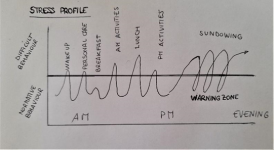martina
New member
- Table of contents
-
- Games
- Keywords
-
- Social and emotional skills
Did you know?
Seniors love a routine!
Seniors love a routine!
If you are a person living with dementia, routines can provide comfort and support, helping you to maintain independence and a sense of time.
Routines often remain accessible even in the middle stages of the disease.
Daily routines can engage you in familiar[1] activities. This can reduce anxiety and frustration and provide a sense of security, calm and control over the environment.
Being engaged in activities helps maintain cognitive function, staying physically and mentally active. In addition, daily activities and routines can give you something to focus on, increasing your sense of productivity and usefulness.
[1] https://www.whereyoulivematters.org/importance-of-routines-for-dementia/
Did you know?
Seniors love a routine!
Seniors love a routine!
Sometimes we want to organise new activities or change daily habits because we think people with dementia will be bored. Instead, routines enhance and reinforce independence and sense of time.
Since routines are stored in long-term memory and dementia usually affects short-term memory first, routines often remain accessible even in the middle stages of disease. Daily routines help people with dementia to cope with short-term memory loss by engaging them in familiar[1] activities. They can reduce the sense of anxiety and frustration arising from unknown and changing environments. Routines make people free to just do things without constantly thinking about how to do it!
A structured routine helps people living with dementia to get through the day with a greater sense of security, calmness and sense of control over the environment. This can be useful for both caregivers and people with dementia. Caregivers will be less concerned about activities to plan. On the other hand people living with dementia will achieve an improvement in mood and a decrease of anxiety and agitation from structured and repetitive activities.
Being engaged in activities helps maintain cognitive function, staying physically and mentally active. In addition, daily activities and routines can give people living with dementia something to focus on, increasing their sense of productivity and usefulness.
In order to plan enjoyable activities, an observation of people with dementia’s behaviour could be very helpful. What times of the day are more stressful? What times of the day are they more agitated? And which ones are more pleasant according to their non-verbal expression and behaviour? Take notes of these, following the chart below.

It could become clear how to organise the day by changing some aspects and plan the day focusing on pleasant moments. Often, challenging behaviours (confusion, aggression, impatience, etc.) occur for a reason, and sometimes the reason is that people with dementia are unable to ask what they want or express what they need.
A few tips[1]:
Since routines are stored in long-term memory and dementia usually affects short-term memory first, routines often remain accessible even in the middle stages of disease. Daily routines help people with dementia to cope with short-term memory loss by engaging them in familiar[1] activities. They can reduce the sense of anxiety and frustration arising from unknown and changing environments. Routines make people free to just do things without constantly thinking about how to do it!
A structured routine helps people living with dementia to get through the day with a greater sense of security, calmness and sense of control over the environment. This can be useful for both caregivers and people with dementia. Caregivers will be less concerned about activities to plan. On the other hand people living with dementia will achieve an improvement in mood and a decrease of anxiety and agitation from structured and repetitive activities.
Being engaged in activities helps maintain cognitive function, staying physically and mentally active. In addition, daily activities and routines can give people living with dementia something to focus on, increasing their sense of productivity and usefulness.
In order to plan enjoyable activities, an observation of people with dementia’s behaviour could be very helpful. What times of the day are more stressful? What times of the day are they more agitated? And which ones are more pleasant according to their non-verbal expression and behaviour? Take notes of these, following the chart below.

It could become clear how to organise the day by changing some aspects and plan the day focusing on pleasant moments. Often, challenging behaviours (confusion, aggression, impatience, etc.) occur for a reason, and sometimes the reason is that people with dementia are unable to ask what they want or express what they need.
A few tips[1]:
- Take into account what they like, their interests and skills
- Spontaneous activities of daily household chores are important to maintain independence and a feeling of accomplishing something: so let them help you wash dishes, set the table before meals, fold laundry, etc.
- Choose times of the day when they operate best and consider rest time and breaks
- Stay flexible and creative (abilities will change as the disease progresses, so the success of an activity may vary from day-to-day)
- Finally, remember that sometimes less is more!
References

Importance of Routine for Dementia | Where You Live Matters
Creating a routine around activities like dressing & eating can help those with dementia know what to expect every day & continue to be independent.

Daily Care Plan
Get information and resources for Alzheimer's and other dementias from the Alzheimer's Association.
[1] https://www.alz.org/help-support/caregiving/daily-care/daily-care-plan
[1] https://www.whereyoulivematters.org/importance-of-routines-for-dementia/
Last edited:


